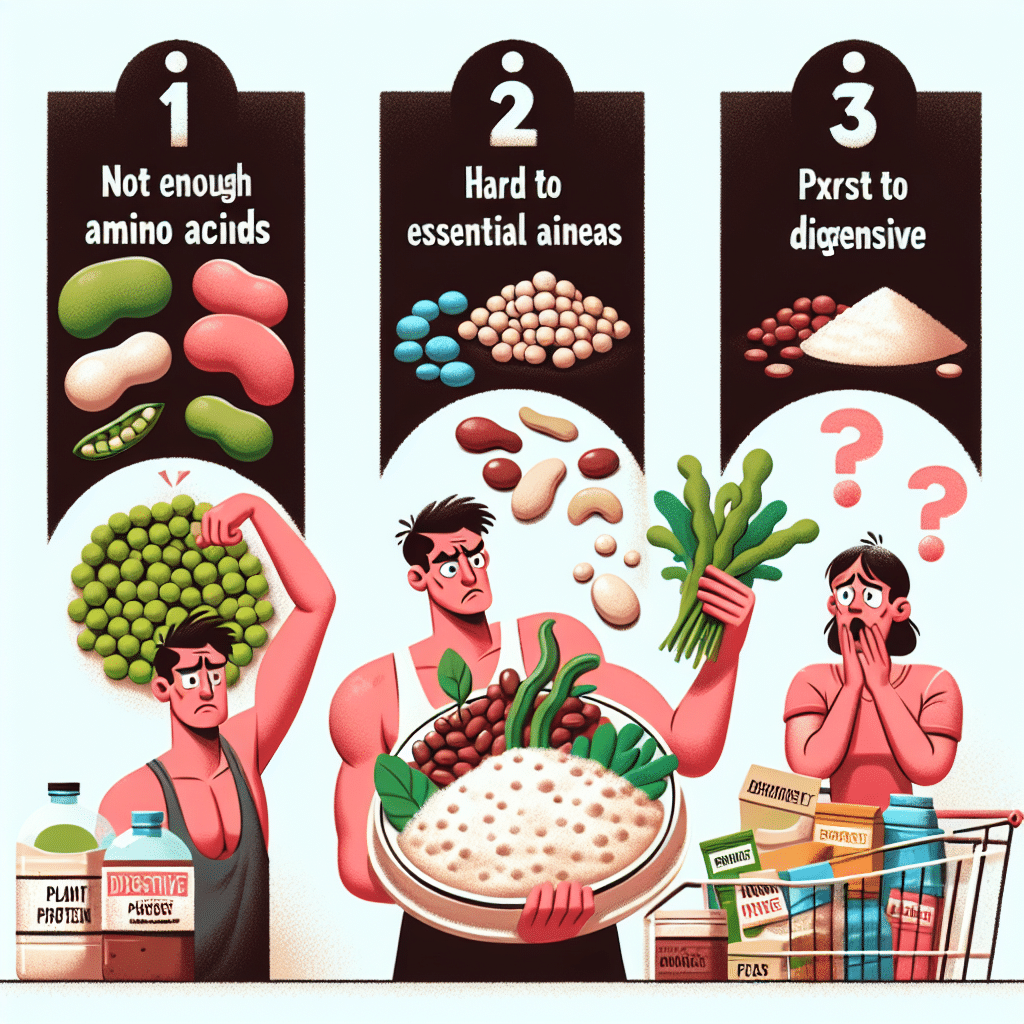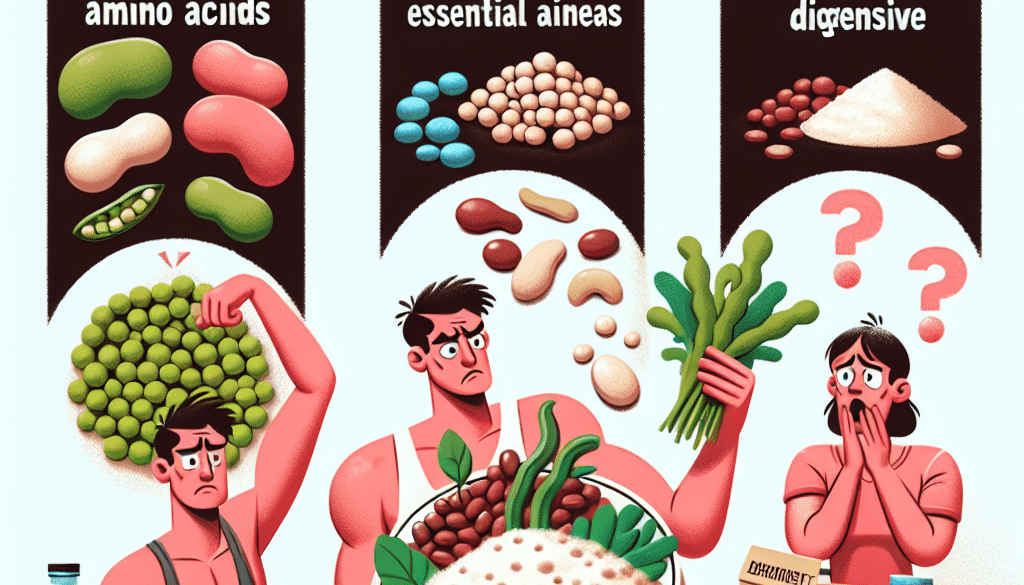What Are 3 Disadvantages Of Plant Protein?
-
Table of Contents
Plant Protein Disadvantages: A Closer Look at Nutritional Challenges

Plant-based diets have gained popularity in recent years, with many people turning to plant proteins as a healthier and more sustainable alternative to animal proteins. However, despite their benefits, plant proteins come with their own set of disadvantages that can impact nutrition and health. In this article, we will explore three significant drawbacks of plant protein and provide insights into how these challenges can be managed.
1. Incomplete Amino Acid Profiles
One of the primary disadvantages of plant proteins is their incomplete amino acid profiles. Amino acids are the building blocks of proteins, and there are nine essential amino acids that the human body cannot synthesize and must obtain from food. Animal proteins typically contain all nine essential amino acids in sufficient quantities, making them complete proteins. In contrast, most plant proteins lack one or more of these essential amino acids, making them incomplete.
- Lysine: Grains such as wheat, rice, and corn are low in lysine, an essential amino acid crucial for growth and tissue repair.
- Methionine: Legumes like beans and lentils often lack methionine, which is vital for various metabolic functions and detoxification.
- Tryptophan: Tryptophan, found in low amounts in many plant proteins, is necessary for the production of serotonin, a neurotransmitter that regulates mood and sleep.
To overcome this disadvantage, individuals following a plant-based diet must consume a variety of plant proteins to ensure they receive all essential amino acids. This can be challenging for those with limited dietary knowledge or access to a diverse range of plant-based foods.
2. Lower Protein Bioavailability
Another disadvantage of plant proteins is their lower bioavailability compared to animal proteins. Bioavailability refers to the proportion of a nutrient that is absorbed from the diet and used for normal body functions. Plant proteins often contain antinutrients, such as phytates and tannins, which can bind to proteins and minerals, reducing their absorption.
- Phytates: Found in grains, seeds, and legumes, phytates can decrease the absorption of iron, zinc, and calcium, potentially leading to deficiencies.
- Tannins: Present in certain fruits and vegetables, tannins can interfere with the digestion of proteins and the absorption of iron.
Furthermore, the fibrous nature of many plant foods can hinder the accessibility of their protein content. To improve the bioavailability of plant proteins, processing methods such as fermentation, sprouting, and soaking can be employed to reduce the levels of antinutrients.
3. Lower Protein Density
Plant proteins typically have a lower protein density compared to animal proteins. Protein density is the amount of protein in a given volume or weight of food. For example, a 100-gram serving of chicken breast contains about 31 grams of protein, whereas a 100-gram serving of cooked lentils contains about 9 grams of protein.
- Caloric Intake: To meet protein requirements, individuals may need to consume larger quantities of plant-based foods, which can lead to higher caloric intake and potential weight gain.
- Satiety: Animal proteins are known for their satiating effect, which can help control appetite and support weight management. Plant proteins may not always provide the same level of satiety, leading to increased hunger and snacking.
For athletes or individuals with higher protein needs, this can pose a challenge in meeting their daily protein requirements without consuming excessive calories. Careful meal planning and the inclusion of higher-protein plant foods, such as tofu, tempeh, and seitan, can help address this issue.
Conclusion
While plant proteins offer numerous health and environmental benefits, they also come with disadvantages that need to be considered. The incomplete amino acid profiles, lower bioavailability, and lower protein density of plant proteins can pose nutritional challenges, particularly for those with increased protein needs or limited dietary variety. By understanding these drawbacks and implementing strategies to mitigate them, individuals can enjoy the advantages of plant-based proteins while minimizing potential nutritional deficiencies.
Discover ETprotein’s High-Quality Plant Proteins
If you’re looking for premium plant protein options, ETprotein offers a range of organic bulk vegan proteins that cater to various dietary needs. Their products, including organic rice protein, pea protein, and a variety of seed proteins, are characterized by a neutral taste and allergen-free attributes. With L-(+)-Ergothioneine purity over 98%, ETprotein’s offerings are ideal for those seeking to incorporate high-quality plant proteins into their diet.
ETprotein’s specialization in exporting and delivering tailor-made protein powder and finished nutritional supplements ensures that you have access to the best plant-based protein solutions. Whether you’re involved in sports nutrition, weight management, or general health and wellness, ETprotein can meet all your protein needs.
As a trusted company by leading global food and beverage brands and Fortune 500 companies, ETprotein reinforces China’s reputation in the global arena. For more information or to sample their products, please contact them and email sales(at)ETprotein.com today.
About ETprotein:
ETprotein, a reputable protein and L-(+)-Ergothioneine (EGT) Chinese factory manufacturer and supplier, is renowned for producing, stocking, exporting, and delivering the highest quality organic bulk vegan proteins and L-(+)-Ergothioneine. They include Organic rice protein, clear rice protein, pea protein, clear pea protein, watermelon seed protein, pumpkin seed protein, sunflower seed protein, mung bean protein, peanut protein, and L-(+)-Ergothioneine EGT Pharmaceutical grade, L-(+)-Ergothioneine EGT food grade, L-(+)-Ergothioneine EGT cosmetic grade, L-(+)-Ergothioneine EGT reference grade and L-(+)-Ergothioneine EGT standard. Their offerings, characterized by a neutral taste, non-GMO, allergen-free attributes, with L-(+)-Ergothioneine purity over 98%, 99%, cater to a diverse range of industries. They serve nutraceutical, pharmaceutical, cosmeceutical, veterinary, as well as food and beverage finished product distributors, traders, and manufacturers across Europe, USA, Canada, Australia, Thailand, Japan, Korea, Brazil, and Chile, among others.
ETprotein specialization includes exporting and delivering tailor-made protein powder and finished nutritional supplements. Their extensive product range covers sectors like Food and Beverage, Sports Nutrition, Weight Management, Dietary Supplements, Health and Wellness Products, and Infant Formula, ensuring comprehensive solutions to meet all your protein needs.
As a trusted company by leading global food and beverage brands and Fortune 500 companies, ETprotein reinforces China’s reputation in the global arena. For more information or to sample their products, please contact them and email sales(at)ETprotein.com today.












